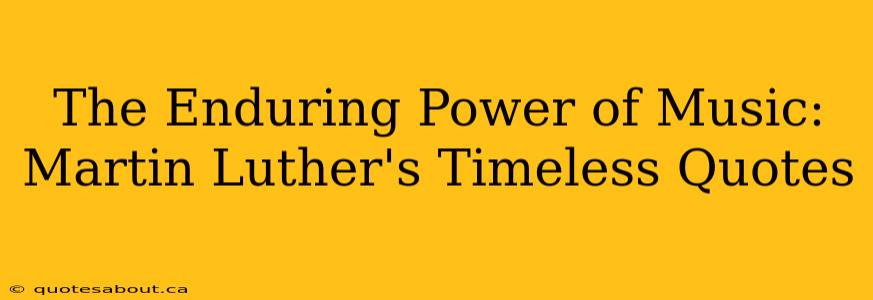Martin Luther, a pivotal figure in the Protestant Reformation, was more than a theologian; he was a man deeply influenced by and deeply influential on the power of music. His profound understanding of music’s ability to shape faith, community, and individual experience is evident in his writings and actions. While not solely focused on music theory or composition, his quotes reveal a nuanced perspective on its role in life, faith, and society, a perspective that continues to resonate centuries later. This exploration delves into Luther's insightful observations on music, highlighting its enduring power through the lens of his timeless words.
What did Martin Luther say about music and its importance?
Luther believed music held an almost sacred position. He saw it not merely as entertainment but as a powerful tool for spiritual growth and communal bonding. His famous assertion, though not a direct quote but a reflection of his views, is that "Music is a gift from God, and it should be used to praise Him." This sentiment underpins his entire philosophy on music's significance.
What is Martin Luther's view on the role of music in worship?
Luther championed congregational singing, believing it fostered a deeper connection to God and fostered a sense of unity amongst worshippers. He saw the act of singing hymns as an active participation in worship, not passive observation. This revolutionary approach contrasted sharply with the prevailing liturgical practices of his time, which often focused on elaborate choral performances conducted primarily by the clergy. He believed that everyone, regardless of musical skill, could participate and engage with their faith through song.
How did Martin Luther use music to spread his theological ideas?
Luther's understanding of music extended beyond the walls of the church. He saw it as an invaluable tool for disseminating his theological ideas to a broader audience. By setting his own texts to readily accessible melodies, he made complex theological concepts understandable and relatable to the common person. The widespread adoption of these hymns played a crucial role in the dissemination of his doctrines and the growth of the Protestant Reformation. He didn't just write hymns; he strategically crafted them to be memorable and easily spread, becoming effective instruments of his theological message.
Did Martin Luther compose music himself?
While Luther wasn't a professional composer in the same vein as Bach or Handel, he was a skilled musician and wrote several hymns himself. His melodies, often simple yet powerful, proved remarkably effective in conveying his message and resonating with people across social strata. He collaborated with other musicians and adapted existing melodies, strategically tailoring them to enhance the impact of his theological lyrics. His contribution extends beyond his original compositions; his advocacy of congregational singing and his insightful understanding of music's communicative power fundamentally changed the landscape of church music.
What are some famous Martin Luther quotes about music?
While pinpointing exact verbatim quotes exclusively focusing on music from Luther can be challenging due to the historical context and the nature of his writings, the core principle permeating his works is his belief in music’s divine origin and its power for spiritual upliftment and social unity. His actions, his advocacy for congregational singing, and his hymns themselves serve as powerful testaments to his views on the subject. Many scholars and historians interpret his extensive writings on liturgy and worship as a profound endorsement of music's vital role in the religious experience.
What is the lasting legacy of Martin Luther's views on music?
Luther's impact on music transcends his own compositions. His advocacy for congregational singing permanently altered the nature of Christian worship, leading to a richer and more participatory experience for believers. The hymns he penned or adapted continue to be sung in churches around the world, his legacy echoing in the very melodies that accompany congregational praise. His profound understanding of music's ability to connect people to faith, to each other, and to something larger than themselves, is a testament to his enduring influence. His perspective on music continues to shape theological reflections on the arts and their role in religious practice and societal cohesion.
This exploration of Martin Luther's views on music reveals his keen understanding of its powerful influence – a perspective that still inspires and informs our appreciation of music’s role in faith, community, and the human experience. His legacy isn't just in the hymns he wrote or the melodies he adapted but in the profound and enduring impact his ideas had on the way we engage with music, especially within a religious context.

